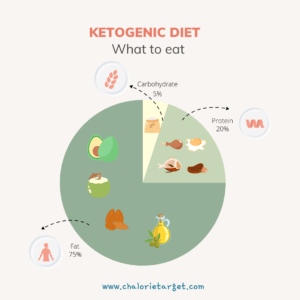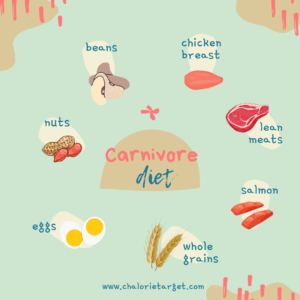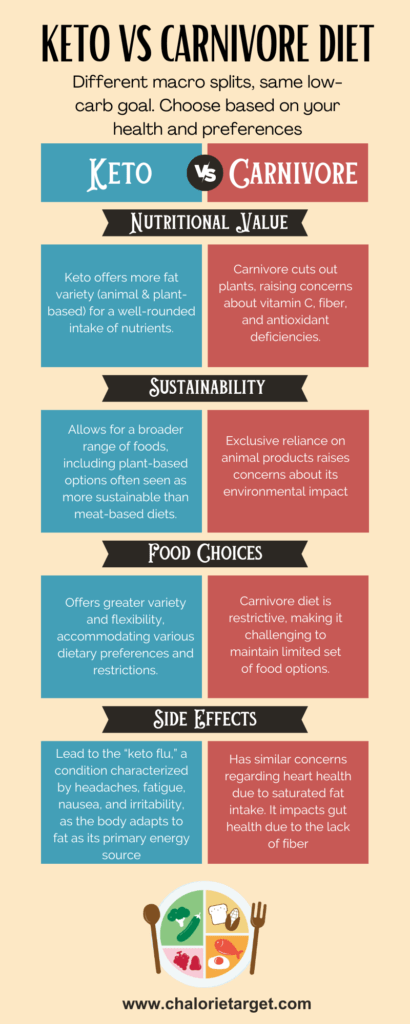- Keto and Carnivore are both low-carb diets for weight loss and health benefits, but Carnivore is stricter, focusing only on animal products.
- Keto allows some plant-based foods for variety and nutrients, while Carnivore may lack fiber and some vitamins.
- Consider your health goals, preferences, and sustainability when choosing between Keto and Carnivore; consulting a healthcare professional is recommended.
In recent years, the difference between Keto and Carnivore diets have emerged as popular dietary strategies among health enthusiasts seeking to improve their health, lose weight, and enhance their overall well-being.
While both diet plans emphasize low-carbohydrate intake, they differ significantly in their approach, allowed foods, and health implications. This blog post aims to provide an in-depth comparison of the keto and carnivore diets to help you make an informed decision.
1. Understanding the Keto Diet
The Keto diet, short for the Ketogenic diet, revolves around a high-fat, moderate-protein, and very low-carbohydrate food intake. The principle behind the Keto diet is to force the body into a state of ketosis, where instead of relying on carbohydrates for energy, the body burns fats, leading to weight loss.
This diet emphasizes consuming foods like meats, fatty fish, nuts, and dairy while significantly reducing carbohydrate-rich foods such as grains, sugars, fruits, and starchy vegetables.

The Keto diet’s popularity stems from its effectiveness in weight loss, improved energy levels, and potential benefits in managing certain health conditions.
a. Health Benefits of the Keto Diet
The health implications of the Keto diet are vast and varied. By significantly reducing carbohydrate intake and increasing fat consumption, the body enters a state of ketosis, which can result in rapid weight loss.
Furthermore, research suggests that the Keto diet may offer additional health benefits, such as improved blood sugar control for individuals with diabetes, enhanced cognitive function, and a potential reduction in heart disease risk factors.
However, it’s essential to approach the Keto diet with caution and awareness of its strict regimen, as the drastic reduction in carbohydrate intake may only be suitable for some and could lead to nutritional deficiencies if adequately managed.
Summary: The Keto diet emphasizes high-fat, moderate-protein, and low-carb intake for weight loss and health benefits such as better blood sugar control and cognitive function. However, its strict rules and major cut in carbs need careful management to prevent nutritional deficiencies.
Read More: What is 80/10/10 Diet? A Comprehensive Guide
2. Exploring the Carnivore Diet
The Carnivore Diet involves eating only animal products and eliminating all plant-based foods. It focuses on meats, fish, eggs, and dairy, mirroring an ancestral diet. It aims for high protein and fat intake while avoiding all carbs, even from fruits and vegetables.
Proponents claim it simplifies eating, reduces food intolerances and allergies, and can significantly improve weight loss and health.

However, critics point out potential risks like vitamin deficiencies and higher heart disease risk due to saturated fat.
Despite these concerns, many followers report benefits like better mental clarity, more energy, and reduced autoimmune disease symptoms. Like the Keto diet, the Carnivore Diet needs careful management to meet nutritional needs.
a. Health Benefits of the Carnivore Diet
While the Carnivore Diet is a topic of much debate, several reported health benefits have attracted individuals seeking alternative dietary strategies. Among these benefits is rapid weight loss, as the diet’s high protein and fat content can increase satiety and reduce overall calorie intake.
By eliminating carbohydrates, the diet aims to stabilize blood sugar levels, which can be particularly beneficial for those with diabetes or insulin resistance.
Some followers also report improved digestive health by cutting out fibrous plant foods, which they claim can cause bloating and other digestive issues.
Furthermore, the diet’s emphasis on whole, unprocessed animal foods means that it can contribute to a higher intake of certain nutrients, such as iron and vitamin B12. However, eliminating plant-based foods requires careful planning to avoid nutritional shortcomings.
Summary: The carnivore diet consists entirely of animal products, promoting weight loss and health improvements but raising concerns about nutrient deficiencies.
Read More: How to Incorporate More Beans into your Diet?
3. What is the Difference Between Keto and Carnivore Diet? Which Diet is Better?
While both diets are low in carbohydrates, their macronutrient breakdowns differ. The keto diet includes a moderate amount of protein and high fat levels.

In contrast, the carnivore diet often results in higher protein and varying fat intakes depending on the cuts of meat consumed. Keto encourages some plant consumption for fiber and nutrients, while carnivores strictly exclude plants from the diet.
Determining which diet is better depends on individual health goals, dietary preferences, nutritional needs, and sustainability considerations.
a. Nutritional Value
While restricting carbohydrates, the ketogenic diet encourages a diverse intake of fat sources, including animal and plant-derived fats. This diversity can contribute to a more balanced intake of essential fatty acids, vitamins, and minerals.
the other hand, the carnivore diet restricts all plant-based foods, potentially leading to deficiencies in specific vitamins and minerals such as Vitamin C, Fiber, and various antioxidants found in fruits and vegetables.
Both diets require careful planning to ensure nutritional adequacy, with the keto diet offering a slightly broader food base from which to draw nutrients.
b. Food Choices
Regarding food choices, the ketogenic diet offers greater variety and flexibility, accommodating various dietary preferences and restrictions. This variety can make it easier to stick to the diet in the long term and adapt it to different cuisines and nutritional cultures.
By its nature, the carnivore diet is highly restrictive, which may make it challenging for some to maintain over time without significant effort to ensure variety and nutritional adequacy from within a limited set of food options.
c. Sustainability
Sustainability is another critical point of debate. The ketogenic diet allows for a broader range of foods, including plant-based options often seen as more sustainable than meat-based diets.
In contrast, the carnivore diet’s exclusive reliance on animal products raises concerns about its environmental impact, including greenhouse gas emissions, land use, and water consumption associated with livestock farming.
d. Side Effects
Both diets come with their potential side effects. The keto diet can lead to the “keto flu,” a condition characterized by headaches, fatigue, nausea, and irritability, as the body adapts to fat as its primary energy source.
Long-term, there are concerns about the impact of such high fat intake on heart health, although this remains a contested area.
The carnivore diet has similar concerns regarding heart health due to high saturated fat intake and potential risks of nutrient deficiencies. It impacts gut health due to the lack of fiber.
Summary: Choosing between the keto and carnivore diets involves careful consideration of one’s health goals, nutritional needs, potential side effects, sustainability concerns, and the range of acceptable food choices. Both diets have pros and cons, and what works for one individual may not. Consulting with a healthcare provider or nutritionist can help make an informed decision that aligns with personal health objectives and lifestyle preferences.
Read More: Unlocking the Sizzle: How do you Make Steak Tender and Juicy
4. Keto and Carnivore Diet Recipes
a. Keto Diet Recipes
- Avocado and Egg Breakfast Bowl: A nutritious blend of avocados, soft-boiled eggs, spinach, and cheese, drizzled with olive oil and sprinkled with salt and pepper for taste.
- Coconut Chicken Curry: It is a rich, flavorful curry made with coconut milk, chicken thighs, curry spices, and vegetables like bell peppers and spinach.
- Zucchini Noodles with Pesto: Spiralized zucchini noodles tossed in a homemade pesto sauce made from basil, garlic, pine nuts, Parmesan, and olive oil.
- Cauliflower Rice Stir Fry: Stir-fried cauliflower rice mixed with vegetables, soy sauce, and beef or chicken, garnished with green onions and sesame seeds.
- Keto Taco Salad: A salad consisting of ground beef cooked in taco seasoning on a bed of lettuce and topped with cheese, sour cream, avocado, and a sprinkle of diced tomatoes.
- Almond Flour Pancakes: Low-carb pancakes made from almond flour, eggs, cream cheese, and vanilla extract, served with sugar-free syrup.
- Baked Salmon with Creamy Lemon Sauce: Oven-baked salmon fillets served with a creamy sauce made from lemon juice, heavy cream, and a touch of Dijon mustard.
- Keto Cheesecake: A rich and creamy cheesecake made with cream cheese, almond flour (for the crust), eggs, and a keto-friendly sweetener topped with fresh berries.
b. Carnivore Diet Recipes
- Ribeye Steak with Butter: A perfectly seared ribeye steak topped with a dollop of grass-fed butter seasoned with salt and pepper.
- Beef Liver Pâté: A smooth pâté made from beef liver, onions, and butter, perfectly seasoned and spread on animal-based “crackers” or eaten alone.
- Eggs Benedict with Carnivore Hollandaise: Poached eggs are served on pork belly slices with a hollandaise sauce made from egg yolks and melted butter.
- Bone Broth: A nutritious broth made from simmering bones with a small amount of apple cider vinegar to extract minerals and nutrients.
- Grilled Lamb Chops: Lamb chops are grilled to perfection, seasoned with salt, and served with homemade bone marrow butter.
Read More: Is it Possible to Build Muscle in a Calorie Deficit?
5. Making an Informed Choice
When choosing between keto and carnivore, consider your health goals, dietary preferences, and the importance of variety in your diet. Consulting with a healthcare provider or nutritionist can help determine the best approach for you, considering your specific health conditions and nutritional needs.
6. Conclusion
Both the keto and carnivore diets offer unique approaches to low-carbohydrate eating, with potential benefits for weight loss and health improvement. However, the best diet you can sustain long-term meets your health requirements.
By understanding the key differences and consulting with health experts, you can make a choice that supports your well-being.
